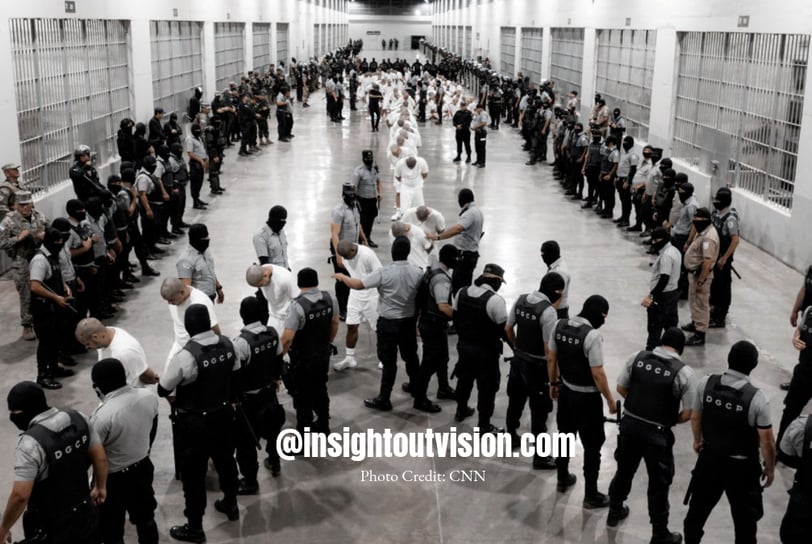Trump’s Deportation Deal: Families Torn Apart, Due Process Denied
5/13/20254 min read


Trump’s Deportation Deal: Families Torn Apart, Due Process Denied
Category: Deep Dive | Sub-Category: Behind the Headlines
Introduction: A Shocking Deportation Scheme
In March 2025, the Trump administration deported over 200 immigrants, mostly Venezuelans, to El Salvador’s notorious Terrorism Confinement Center (CECOT), a maximum-security prison known for its brutal conditions. Many of these deportees, labeled as gang members under the Alien Enemies Act, had no criminal records and were denied due process. Left behind in the U.S. are their wives, children, and communities, grappling with the fallout of a policy that critics call unlawful and inhumane. This Deep Dive explores the human cost, legal questions, and political motives behind this controversial move, asking: Is this justice, or a narrative built on fear?
The Deportation Operation: A Hasty Crackdown
On March 15, 2025, three planes carrying 238 immigrants, primarily Venezuelans, landed in El Salvador. The Trump administration, invoking the 1798 Alien Enemies Act, claimed these individuals were members of the Venezuelan gang Tren de Aragua, justifying their deportation without immigration hearings. The operation, executed in just 48 hours, was part of a deal with El Salvador’s President Nayib Bukele, who agreed to house deportees in CECOT, a prison designed for terrorists and gang members. The U.S. paid El Salvador $4 million in “grants” to detain them, raising questions about outsourcing incarceration.
The Human Toll: Families Shattered
Many deportees had deep ties in the U.S., including spouses and U.S.-citizen children. For example, Kilmar Abrego Garcia, a Salvadoran living legally in Maryland with a work permit, was deported despite a 2019 court order barring his removal. His wife and children, left in limbo, learned of his fate only through Salvadoran propaganda videos. Similarly, Venezuelan Daniel Lozano-Camargo, a 20-year-old Houston resident, was deported despite a 2024 legal settlement protecting him. His mother, Daniela Camargo, described him as a non-criminal seeking a better life, targeted for his tattoos. Families report “enforced disappearances,” with no contact allowed at CECOT, where inmates face torture and indefinite detention.
No Crimes, No Due Process
A 60 Minutes investigation revealed that 75% of the deportees had no criminal records, with most of the rest having only minor misdemeanors. Only 3% had serious convictions. The Trump administration admitted in court that many lacked criminal histories, arguing that “unknown profiles” justified their detention as potential threats. This bypassing of due process—denying hearings or evidence review—has sparked legal challenges. Federal judges, including Trump appointees, have ruled the use of the Alien Enemies Act illegal, citing no evidence of an “invasion” to justify wartime powers. The Supreme Court temporarily blocked further deportations, but hundreds remain in CECOT.
Legal and Ethical Questions
The Alien Enemies Act, used only three times since 1798, allows deportations during declared wars or invasions. Critics argue Trump’s invocation, based on unproven gang affiliations, violates the Fifth Amendment’s due process clause. The ACLU and Human Rights Watch have filed lawsuits, with one before the Inter-American Commission of Human Rights, demanding the release of 18 Venezuelans held incommunicado. The case of Abrego Garcia, ordered returned by a U.S. court but still detained, highlights the policy’s defiance of judicial oversight. El Salvador’s prison system, notorious for torture and human rights abuses, adds an Eighth Amendment concern, as deportees face cruel conditions without conviction.
The Bukele Connection: A Political Alliance
The deal with Bukele, a Trump ally, underscores political motives. Bukele, who publicly celebrated the deportations, privately sought assurances that all deportees were gang members, fearing diplomatic fallout. Despite this, non-criminals were sent, including women who were returned to the U.S. and a Nicaraguan rejected by El Salvador. Trump’s push for more “mega-prisons” and his suggestion to send U.S. citizens to CECOT signal an escalation of this approach. Critics see this as pandering to Trump’s base, amplifying fears of immigrant crime while ignoring evidence to the contrary.
Public Reaction: A Divided Narrative
Posts on X reflect polarized sentiments. Some praise Trump’s “tough on crime” stance, echoing claims that deportees are dangerous. Others condemn the policy as kidnapping, citing the 60 Minutes findings and cases like Abrego Garcia’s. Protests in Caracas and San Salvador demand the deportees’ release, while U.S. Democrats, including Senator Chris Van Hollen, have rallied for accountability. The White House, however, has doubled down, with Trump aides accusing deportees of terrorism despite court rulings. This narrative of “gangbangers” versus “innocent families” fuels ongoing debate.
Analysis: Fairness or Fearmongering?
The policy’s fairness is dubious. Deporting non-criminals to a brutal foreign prison, bypassing due process, and separating families contradicts U.S. legal principles. The lack of evidence—75% of deportees had no criminal records—suggests a rush to vilify immigrants for political gain. The Bukele deal, while strategic, risks diplomatic strain and moral credibility, especially as courts reject the legal basis. This appears less abut justice and more about perpetuating a narrative of immigrant danger, ignoring the human cost to wives, children, and communities left behind. The policy’s reliance on fear over facts raises questions about its sustainability and ethics.
What’s Next: A Legal and Moral Reckoning
As legal battles continue, the fate of those in CECOT hangs in balance. Courts may force more returns, but Bukele’s resistance and Trump’s defiance complicate matters. The policy’s fallout—fractured families, international criticism, and eroded trust in U.S. justice—demands a reevaluation. For now, the deported remain “ghosts” in U.S. courts, their stories a stark reminder of the stakes in immigration policy. This isn’t just about borders; it’s about who we are as a nation.
Thought-Provoking Questions:
Should the U.S. prioritize deporting alleged gang members without evidence, or focus on due process to protect families?
How does the outsourcing of detention to El Salvador’s CECOT reflect on America’s commitment to human rights?
Is the Trump-Bukele deal a legitimate crime-fighting strategy, or a political tactic to fuel anti-immigrant sentiment?
What responsibility does the U.S. have to reunite families separated by these deportations?
Explore deep insights on current events and growth.
Vision
Truth
hello@insightoutvision.com
+1-2236036419
© 2025. All rights reserved.
